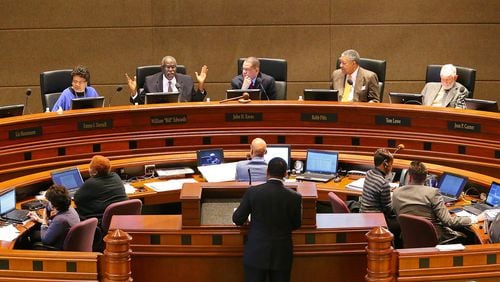Fulton County Commission candidates
District 1: Liz Hausmann (R) (i)
District 2: Bob Ellis (R), Eric B. Broadwell (R)
District 3: Bernard “Bernie” Tokarz (R), Everett Lee Morris III (R), Cory Ruth (R), Alexander Palacios (R)
District 4: Joan P. Garner (D)(i), Eddie Lee Brewster (D)
District 5: Brenda J. Muhammad (D), Johnnie Gordon (D), Advis Dell Wilkerson-Byrd (D), Kwame Thompson (D), Marvin S. Arrington Jr. (D)
District 6: William “Bill” Edwards (D)(i), Emma I. Darnell (D)(i), Abraham Watson (R)
District 7: John H. Eaves (D)(i), Robert L. “Robb” Pitts (D)(i), Earl L. Cooper (R)
A shakeup on the Fulton Board of Commissioners brought on by redistricting and retirement could lead to significant changes for Georgia’s largest county.
Last week 20 candidates filed to run for seven commission seats in the May 20 primary election, and already several things are apparent. The commission that takes office next January will be more Republican. North Fulton residents will have a greater say in county affairs. And at least three incumbent commissioners will be gone – the biggest turnover in a generation.
The impact on Fulton government could be substantial. The commission controls a $625 million budget and some 5,000 employees serving nearly 980,000 residents. More of those resources likely will be directed to north Fulton, where residents have long complained they pay most of the taxes but get little in return.
And Republicans have a shot – some say a long shot – at winning a majority of a commission long dominated by Democrats. But even if they don’t win a majority, Republicans’ desire for a smaller, more focused county government is likely to get a better hearing.
Some who may benefit from the changes say the commission is overdue for a shakeup.
“Everybody in Fulton County – black, white, Republican, Democrat, gay, straight, Jew, Christian, whatever – is poorly served by the current commission,” said Bernie Tokarz of Buckhead, one of four Republicans seeking election in the newly drawn commission District 3.
But feelings are still raw over the way Republicans in the General Assembly last year pushed through a redistricting plan that some called an attempt to undermine the power of minority voters. Democratic Commissioner Bill Edwards said, “These people are so hung up in their viciousness that they don’t see the consequences.”
Any consequences may be overshadowed for now by Republican gains in county government. A look at last week’s candidate filings shows:
• No Democrats filed to run in three commission districts representing north Fulton. That means the Republicans who win the primary election in those districts are almost guaranteed a spot on the commission (though it’s possible independent candidates could file in June to run in the November general election). Currently the commission has only two Republicans – Liz Hausmann of Johns Creek, who is unopposed for re-election, and Tom Lowe of Atlanta, who is retiring after 40 years on the commission.
• Democratic incumbents are running against each other in two other races. In the countywide chairman’s race, incumbent John Eaves faces fellow Commissioner Robb Pitts, whose countywide at-large seat was converted to a new north Fulton district. The winner will face Republican Earl Cooper in November.
• In south Fulton District 6, Edwards faces fellow commissioner Emma Darnell, who was drawn into Edwards’ district under last year’s redistricting plan. The winner will face Republican Abraham Watson in November.
Edwards and Darnell have long been allies who have at times butted heads with north Fulton Republicans. The Republicans’ move to pit them against each other is widely seen as payback.
Edwards and Darnell said they don’t plan to campaign against each other, but will let south Fulton residents decide who best can serve them.
“I wouldn’t give the authors of this (redistricting) the thrill of even thinking they would drop Darnell and Edwards in an arena where we would have to tear each other apart,” Edwards said.
The redistricting plan is one of several ways Republicans in the General Assembly last year tried to remake Fulton County in their image. Among other things, they also approved bills making it easier to fire county employees and prohibiting commissioners from raising property taxes until 2015.
The measures stemmed from long-standing complaints that county government is bloated and pays too little heed to north Fulton concerns. Those sentiments have fueled resentment of county government and talk of creating a separate Milton County out of what is now north Fulton.
“The folks in north county believe that they get nothing of significance from Fulton County government,” said Lee Morris, a Republican and former Atlanta City Councilman running for commission District 3.
An investigation by the Atlanta Journal-Constitution last fall showed Fulton spends far more than neighboring counties on some services. But the AJC found Fulton’s spending is often in line with or less than comparable large urban counties across the country.
In a separate investigation, the newspaper found some truth to the complaint that the county spends less in north Fulton on services like libraries and senior services.
Eaves said many county facilities are clustered in Atlanta because the city for decades was Fulton’s main population center. As north Fulton’s population exploded in recent decades, county facilities didn’t keep pace.
Eaves thinks that will start to change next year when the new commission is sworn in.
“The dynamic and the composition (of the commission) will force us to identify new priorities that will lead to greater delivery of services throughout the county and more efficiency,” he said.
Pitts and Cooper, the other chairman candidates, offered similar assessments. Both said it will be crucial to have the right leadership, along with a willingness to work with Atlanta and other cities.
“The county is fractured,” Pitts said. “I think it’s the leadership at the top that inspires people.”
It’s unclear how far Republicans can take their campaign to remake county government. Fulton remains a Democratic stronghold – President Barack Obama won 64 percent of the vote in 2012. But candidates from both parties said a more equal sharing of power could alleviate some of the tensions that have riven the county for decades.
“Let’s work together for once to accomplish good for the whole county, instead of particular areas,” Cooper said. “Stop all this turf war.”







